The Iranian regime on Thursday sent new signals that it is preparing for a bloody crackdown on hijab protesters, as hardline Islamist President Ebrahim Raisi insisted his government respects “freedom of speech” but “acts of chaos are unacceptable.”
Raisi claimed from the sidelines of the U.N. General Assembly that he has ordered an investigation into the event that sparked a week of massive demonstrations across Iran, the murder of a 22-year-old Kurdish woman named Mahsa Amini by thuggish “morality police” for the offense of wearing her headscarf improperly.
Raisi accused the Western world of having “double standards” for denouncing the heartless killing of Amini, because police in other parts of the world sometimes kill people, as well. He did not dwell on the inconvenient detail that Amini was assaulted and killed merely because a lock of hair was showing from beneath her headscarf when she arrived by train in Tehran to visit relatives last week.
“Every day in different countries, including the United States, we see men and women dying in police encounters, but there is no sensitivity about the cause and dealing with this violence,” he said, having possibly missed the huge demonstrations and heated political battles over that very subject sweeping across the civilized world over the past few years.
Raisi ordered tighter enforcement of the laws for women’s clothing in July, complaining that women defying the hijab laws with impunity were promoting “corruption in Islamic society.”
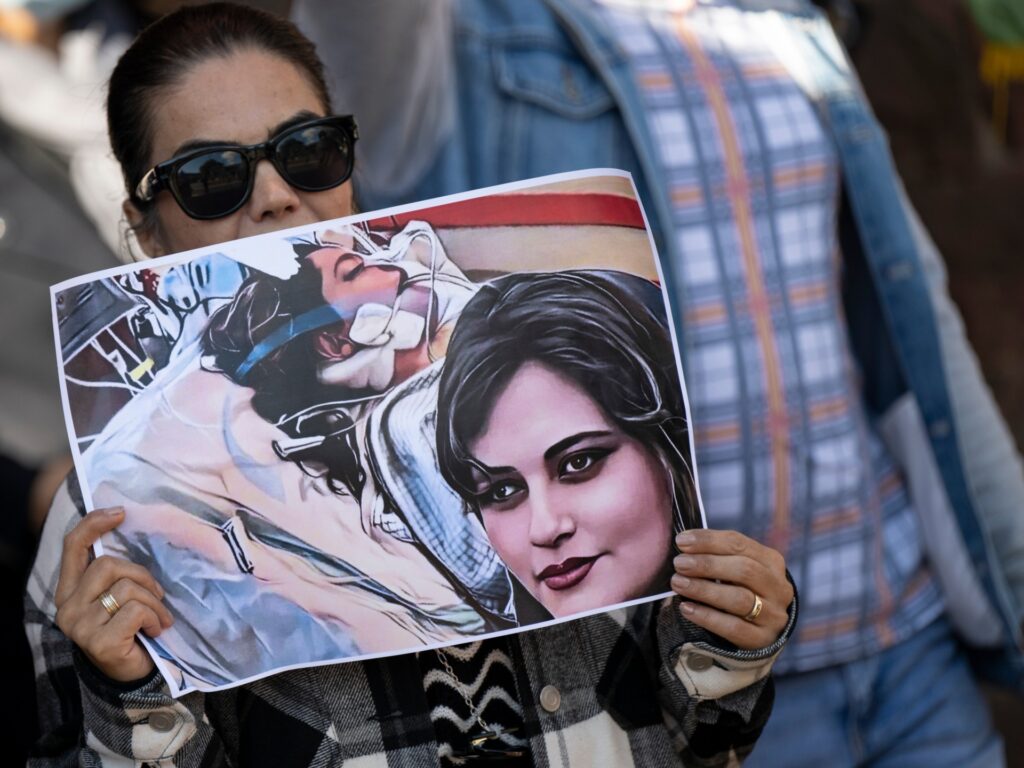
21 September 2022, Hessen, Frankfurt. An Iranian woman takes part in a demonstration against the political regime in Iran in front of the U.S. consulate in Frankfurt. She holds a poster with the picture of 22-year-old Mahsa Amini, who died last week in Iran after being arrested by the morality police. (Boris Roessler/picture alliance via Getty Images)
“The enemies of Iran and Islam using extensive satellite TV and social media networks have targeted society’s cultural backbone and foundations of its religious values,” he claimed in July, without offering any evidence of such a conspiracy.
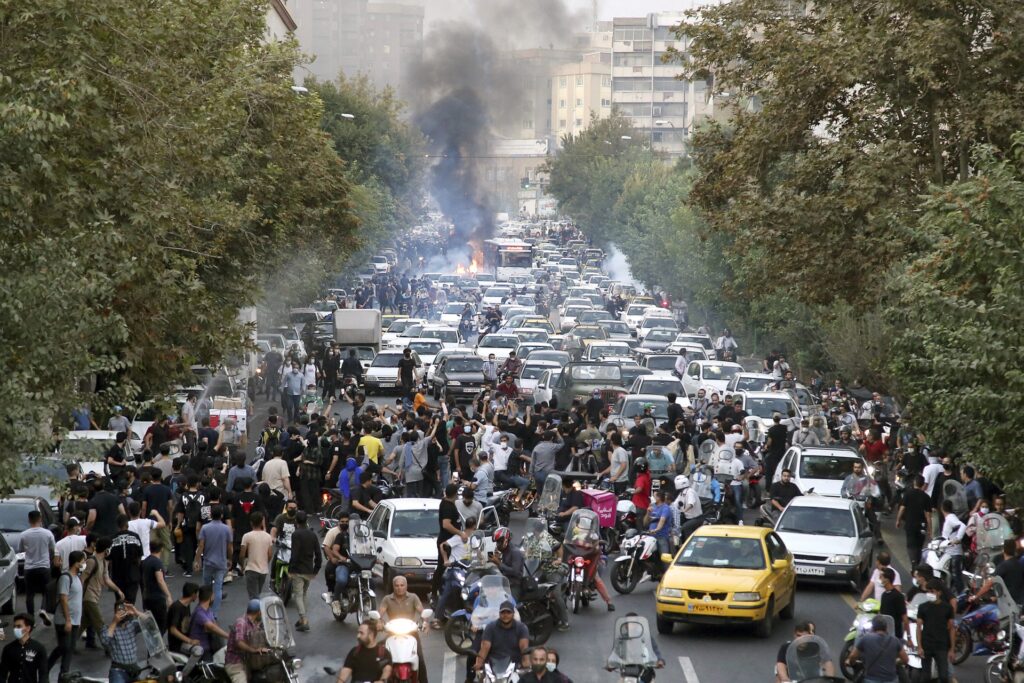
In this photo taken by an individual not employed by the Associated Press and obtained by the AP outside Iran, protesters chant slogans during a protest over the death of a woman who was detained by the morality police, in downtown Tehran, Iran, Sept. 21, 2022. (AP Photo, File)
The streets of Iranian cities are prowled by goon squads known as the Gasht-e Ershad or “Guidance Patrols,” commonly referred to as the religious police or morality police. A member of the morality police explained to the BBC on Thursday that they work in six-person squads, with two members of each team being women, and spend much of their time looking for dress code violations they can punish.
The BBC’s source, a very rare example of an Iranian morality enforcer willing to speak with foreign media, said he was originally told his job was to “protect women” because “men could get provoked and harm them” if they do not dress with mandated modesty, but he grew disillusioned as he witnessed his squad going after women with extraordinary vigor and brutality.
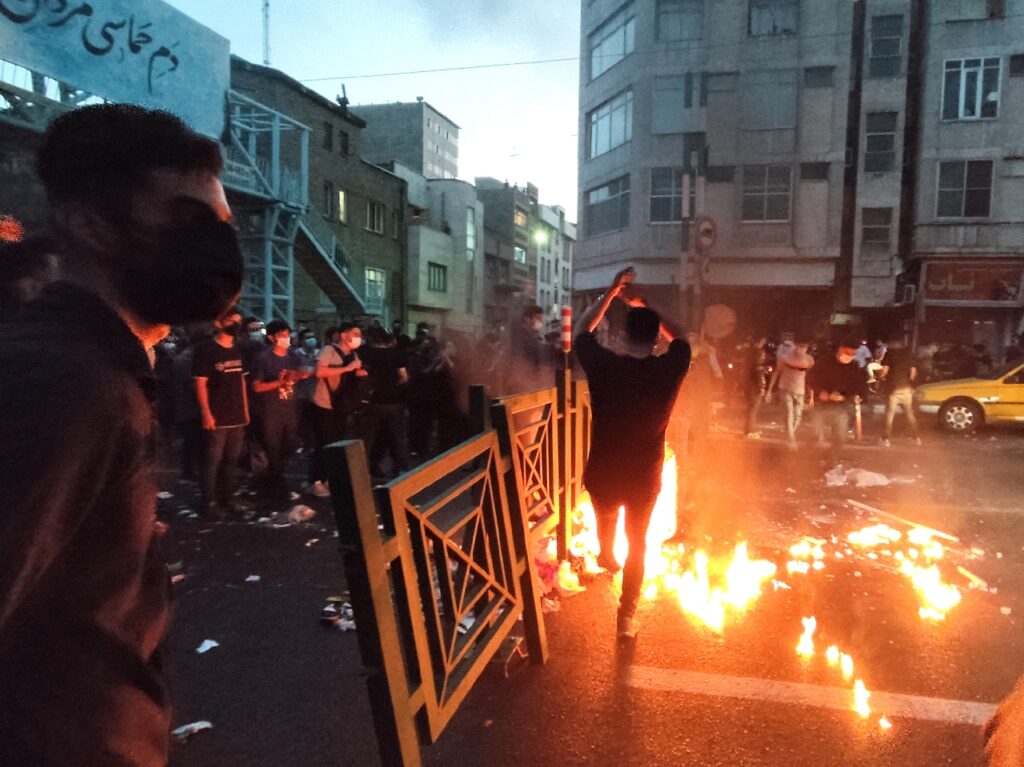
A picture obtained by AFP outside Iran shows demonstrators on the streets of Tehran as protests over the death of young woman in morality police custody spread across the country.
“It’s weird, because if we are just going to guide people why do we need to pick somewhere busy that potentially means we could arrest more people? It’s like we are going out for a hunt,” he observed.
“They expect us to force them inside the van. Do you know how many times I was in tears while doing it?” he added, referring to the sort of kidnapping and beating Mahsa Amini was subjected to.
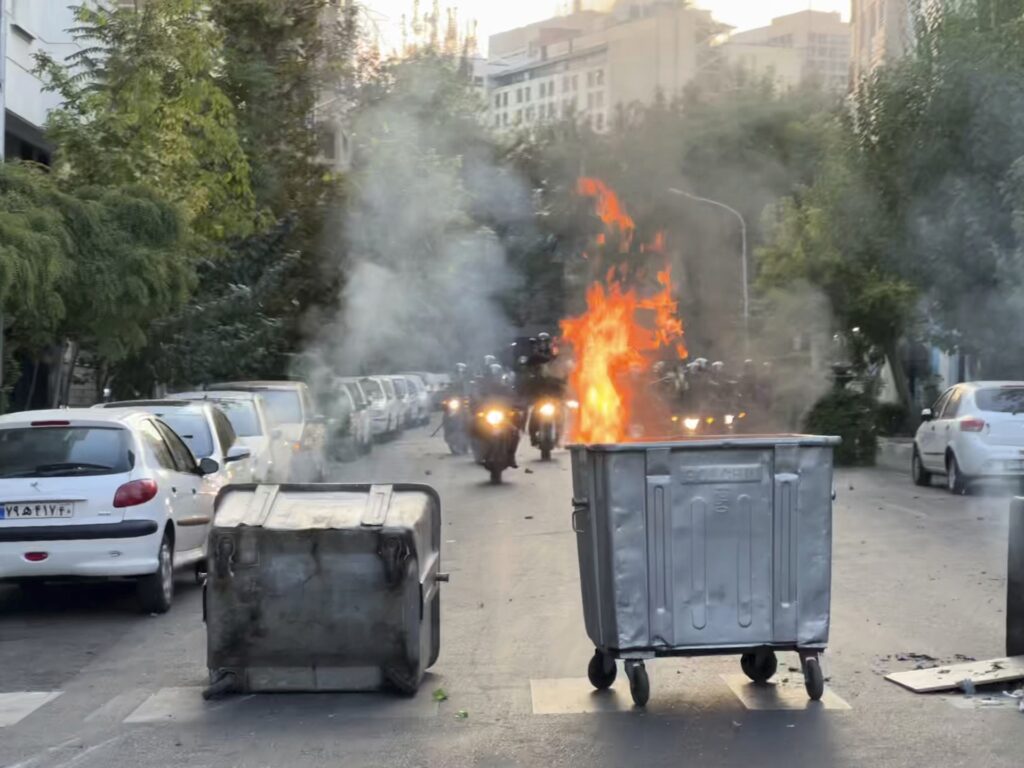
In this Tuesday, Sept. 20, 2022, photo taken by an individual not employed by the Associated Press and obtained by the AP outside Iran, a trash bin is burning as anti-riot police arrive during a protest over the death of a young woman who had been detained for violating the country’s conservative dress code, in downtown Tehran, Iran. (AP Photo)
The U.S. Treasury Department announced sanctions against the Iranian morality police and related law-enforcement agencies on Thursday, for both the death of Amini and brutally repressive actions taken toward protesters.
The Iranian army warned on Friday it was ready to “confront the enemies” of the regime, by which it meant the demonstrators, who it ominously described as agents of a sinister foreign plot to undermine the Iranian government.
“These desperate actions are part of the evil strategy of the enemy to weaken the Islamic regime,” the army said.
Iranian Intelligence Minister Mahmoud Alavi on Friday dismissed the demonstrators as “seditionists” and vowed their “dream of defeating religious values and the great achievements of the revolution will never be realized.”
The regime staged pro-government demonstrators on Friday, with chants of “Death to America,” “Death to Israel,” and denunciations of the hijab protesters as “Israel’s soldiers.”
“Offenders of the Koran must be executed!” the pro-government demonstrators howled.
Iranian state television on Friday claimed the death toll from the week’s protests could be as high as 26, without evidence or independent confirmation. The Associated Press counted 11 documented deaths, including demonstrators, Iranian security forces, and pro-regime militia operatives.
Outside monitoring groups reported Internet outages and social media shutdowns continued across Iran on Friday as the regime struggled to suppress demonstrations. Facebook on Friday denied accusations it has been collaborating with the Iranian regime to disrupt Internet communications.
Iranian human rights activists reported on Thursday that access to their WhatsApp accounts had been blocked, an action they believe the regime could not have taken without cooperation from Facebook, which owns WhatsApp. A London-based Persian-language media outlet called Manoto TV said Facebook deleted videos related to the protests from its Instagram page, even though they had millions of shares.
“We exist to connect the world privately. We stand with the rights of people to access private messaging. We are not blocking Iranian numbers. We are working to keep our Iranian friends connected and will do anything within our technical capacity to keep our service up and running,” WhatsApp management responded.
Iranian activists and reporters were unpersuaded by this denial, insisting a large number of their posts have disappeared from Facebook-owned pages.
The U.S. Treasury Department took steps on Friday to counter Iran’s Internet blockages by expanding the list of services American entities can provide in Iran without violating sanctions. The new exemptions should make it easier for satellite services to reach Iranian customers, providing a link to the Internet that cannot easily be severed by the oppressive regime.
“The United States is redoubling its support for the free flow of information to the Iranian people. With these changes, we are helping the Iranian people be better equipped to counter the government’s efforts to surveil and censor them,” said Treasury Deputy Secretary Wally Adeyemo.
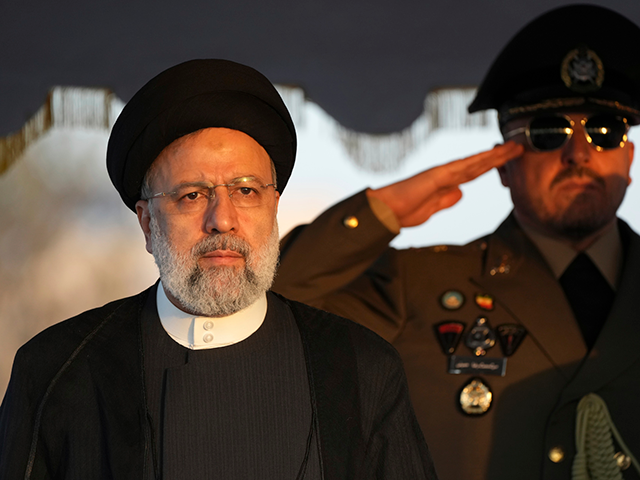
COMMENTS
Please let us know if you're having issues with commenting.